|
The Rusty Toque is pleased to cross-post the All Lit Up blog's Poetry Month series Poetry Primer in which poets from across the country select their favourite up-and-coming poets. Visit the All Lit Up blog for this and other Poetry Month treats! Our first established poet in our Poetry Primer series is Elizabeth Bachinsky. Hailing from British Columbia, Bachinsky has published five collections of poetry, including her latest The Hottest Summer in Recorded History (Nightwood Editions). She has been nominated for such awards as the Governor General's Award for Poetry and the Pat Lowther Award, and her poetry has been adapted for both stage and screen. Applauded by Jeanette Lynes for her "sheer moxie" we knew she was a great poet to kick off our National Poetry Month festivities! When we asked her to select an up-and-coming poet Elizabeth chose a fellow West Coaster, Kayla Czaga. Kayla published her first collection of poetry with Nightwood Editions, For Your Safety Please Hold On last fall and it was recently the only debut collection nominated for the Dorothy Livesay Poetry Prize. Poet Paul Vermeersch said this about her collection: "... Reading it is like being brought into someone’s home and told all the family secrets—never an imposition, it feels rather like an initiation into the clan." Enough of an introduction, over to Elizabeth! * * * Elizabeth Bachinsky on why she selected Kayla Czaga: I first met Kayla Czaga in 2013. She was one of my students in a graduate publishing class at UBC—the kind of class where you learn to tell your kerning from your leading—and one day after class, despite my protesting, she shoved a fistful of poems in front of me and we sat down to talk about them. I was not only taken by the talent evident in the poems on the table in front of me but also with the young woman who had produced them. Blushing, stammering, she gave me a history of the Stakhanovite movement in socialist Russia and her appraisal of the effectiveness of Russian propaganda which struck her, if I’m remembering correctly, as “effective.” Czaga was, I think, twenty-one at the time and was nearly through with her graduate degree. She came from Kitimat. She lived above a grocery store. She wrote these very grown-up insightful poems. It was as if a valkyrie had let down beside me. Later on, I’d turn out to select one of her poems, the poem featured here for National Poetry Month, as a winner for a poetry competition at the Fiddlehead magazine. The judging was blind. They’d sent me quite a stack, and still that poem, hers, rose to the top of the pile. Blind. There’s just something about her voice. Funny, confident, unique. I can only describe it as the kind of voice into which one can relax. Because you can trust Kayla Czaga. She’s got this. She knows where she’s headed. It’s OK. You can just relax and enjoy the poems. I don’t know what impact any of us poor poets can hope to have on Canadian poetry in the long run. But I hope Czaga will be one of those who keep adding to it. Her first book is every bit as interesting as first books by Erin Moure or Karen Solie and, like them, I want to read Czaga in ten, twenty, thirty years and see what fascination she’s following now. Selfishly, I just want her to keep going. Keep going, will you, Czaga? Kayla Czaga on why she writes poetry & who her influences are:
I write because I like writing more than I like doing anything else. Why do I like writing? I don’t really know. I could’ve easily liked doing other things—playing tennis or saxophone or sculpting. I think it has something to do with my upbringing. I grew up in a small northern BC town where people didn't usually talk about a lot of deep issues. I don’t have siblings and my parents are quiet people, so I read a lot. Books spoke to me about a great many things. Is it cheesy to say they were my best friends? They were my best friends. I started writing instinctually in response to the reading I did. My entire childhood and adolescence I wrote—everything from screenplays to novels about my cat—and I haven’t stopped, though I mostly write poems now. I can’t really imagining doing much else with my time. I am always accumulating new favourite writers, so it’s difficult to list writers who have influenced me without feeling I’ve skipped many people. I own most* of Anne Carson’s books, so I think she’s been significant. Matthew Zapruder. Mark Strand. Anne Michaels. Mary Ruefle. Dean and Kevin Young (not related). I am also inspired by language in the world. The title (and title poem) of my book For Your Safety Please Hold On comes from stickers on Vancouver buses. Another poem I wrote is called “May Contain Traces.” A few years ago, I was at a hostel in the Okanagan that was plastered with signs that said, “You are in video.” I loved that. *I can’t say “all” because I lent one to a friend and it never came back, and I haven’t replaced it yet. * * * We'll be back tomorrow with more poetry! Want to know which other poets we'll be featuring in our Poetry Primer series? Check out the details here. 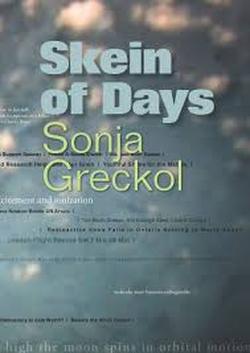 SKEIN OF DAYS SKEIN OF DAYS By Sonja Ruth Greckol Pedlar Press, 2014 In her second collection, innovative Canadian poet Sonja Ruth Greckol set herself the task of reconstructing “the time of her life,” 1945 until the turn of the century. Rather than untangle formative issues for us, Skein offers the tangle itself: a diary of entries compiled and composed around Greckol’s February birth date as published in print media, popular songs and poems excerpted from the Governor General’s Poetry Award collections as well as witty prose poems, some incorporating symbols and blanks as well as catch phrases and illustrations. Found poems consisting of garbled headlines introduce the reader to the vocabulary that typified the era. Occasionally I felt as though I were there absorbing the news as though skimming a journal over a train passenger’s shoulder or half-listening to the radio. An amazing range of issues is considered: the new feminism, guns & butter, mining, farming, first nations peoples, the Cold War, poverty, as well as lives of ordinary Canadians. Highlights are the lyric poems that book-end the volume and appear intermittently throughout. The initial untitled poem introduces us to Greckol’s view of what constitutes history and the “intricate textual rhythms” of her language: The hidden, the obscure fall In Coda: More Things Thing Up, (a terrific title) Greckol pulls the skein tight: the times are varied, chaotic; she (and we) house it all, and struggle: Change accumulates time, weaves rhyme geographic Headlines and subheads appropriated, often reconstructed into dense, highly active lines plus brief personal narratives tie the collection together. These collage-like word-flows—cacophonous, soothing, disturbing, comic, comforting, melodic—replicate the era’s ambient sounds: 1962 From this unique, well-researched volume, two lines I’ll never forget: “You’re always running into people’s unconscious,” says Marilyn Monroe in July 1961 and the beautiful mysterious line from 1947, A bomb snow made ladies out of trees… You can read an excerpt for Skein of Days in Issue 6 of The Rusty Toque Lee Gould's poems, essays, and reviews appear in: Blithe Spirit, Bridges, Magma, Quarterly West, The Berkshire Review, Salmagundi, Gay and Lesbian Review, Chronogram, Women and Environments, Passager and other journals; in anthologies “Burning Bright,” “Still Against War,” “A Slant of Light: Women Writers of the Hudson Valley.” Her chapbook “Weeds” appeared in 2010.
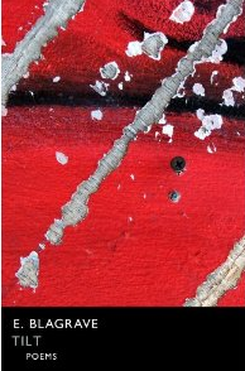 Tilt: Poems Tilt: Poemsby E. Blagrave Cormorant Books, 2012 E. Blagrave was twenty-three years old when The Fiddlehead published all thirteen of her submissions in a single issue. Forty years later, those thirteen poems—brief and startling snapshots of the natural world in flux—appear in their original form in Blagrave’s first collection, Tilt. The collection is filled out with her work from the past few years, and her publisher, Cormorant Books, makes note of her gap in production on the book’s jacket. What’s most interesting about her publishing history is how little it matters to the continuity of the collection. Her older poems like “The Sea Gull” and “Sooke River” are threaded between newer work like “Ghosts” and “All Day The Rain”. Blagrave’s voice is undiminished despite decades when she didn’t publish any verse; it is rooted in the material and familiar tropes of Canadian literature, but also too ethereal to pin down to a formal or a traditional sense of narrative. Most poems don’t extend beyond a page but manage to tap into eternal concepts in only a few terse lines, like in “Dad” where “Profound love/beat against the tides/seemed to make the moon grow/he understood me/knew what made me/rampage through night” (37, 10-15). Her ethereal style is paired with a microscopic eye for detail, so Blagrave doesn’t avoid the big stuff, either. In “I catalogue the books” self-awareness prevails: “I catalogue the books/I make my bed of leaves/I live in a century/of turmoil” (50,1-4). The chaos of the 20th century fuels Blagrave’s blatantly naturalistic, fanciful and spirit-like voice. While she may argue “false hope/ plagues me/ I deliver these/ few poems/ in your hands” (57, 12-16) there is no doubt readers wish she would deliver those few poems more often. Alex J. Carey graduated from Western University with an honours degree in English Literature with a minor in Creative Writing. He is the runner up for Western's 2013 Alfred R. Poynt Award in Poetry. His short fiction has appeared in The Regis, and he has written music and book reviews for The Gazette and Qwiklit. Reading and writing is a good time, but all in all, he'd rather be camping.
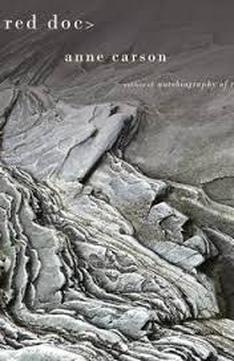 red doc> red doc>by Anne Carson McClelland & Stewart, 2013 Anyone who picks up Red Doc> expecting another Autobiography of Red is going to be disappointed--but disappointed in a good way. One of the joys of reading a new Anne Carson book is savoring its groundbreaking originality, and Red Doc> is no exception. Written mainly in narrow columns of sporadically punctuated verse, it continues the tragicomic, mythology-inspired romance of Geryon and Herakles, now named "G" and "Sad But Great." Like Autobiography of Red, the plot of Red Doc> is fairly episodic, driven by elliptical waves of language rather than dramatic incident, but the overall tone has changed. Emotion has been largely traded for thought, immersion for detachment, realism for absurdism, mythology for modernity. Whereas Autobiography of Red was a heartbreaking portrait of the artist as a young red man with wings, Red Doc> is an equally painful (yet surprisingly funny) snapshot of the disillusioned artist as a not-so-young man, who has come to prefer Proust to philosophy, comfort to adventure, irony to grief. Carson's epigraph from Samuel Beckett ("Try again. Fail again. Fail better.") not only foreshadows the central characters' hopeless attempt to rekindle their relationship, but also sets the stage for the world of the novel as a whole. The barren landscapes, the absurd interactions, the surreal characters--everything seems to have wandered out of a Beckett play. However, Carson blends her unique imagination with Beckett's so seamlessly that his influence is never overpowering, always complementary. Not many writers could confront such a heavyweight precursor so effectively--let alone so directly--which reminds us again why she is considered one of North America's most powerfully original contemporary writers. Chris Gilmore is currently pursuing a Masters in English and Creative Writing at the University of Toronto. He writes fiction, plays and screenplays.
|
RUSTY RECOMMENDS
In the spirit of supporting writing—especially writing that's off the radar or under appreciated—we want to know what you are excited about reading and what you think we should be reading. Your recommendations should be paragraph length (approximately 250 to 300 words) and should briefly summarize the book and detail why you are recommending it or why you think others should read it. Send our reviews editor Aaron Schneider your recommendations of Canadian and International fiction and poetry. Please write "Rusty Recommends" in the subject line. Include your (250 to 300 word) recommendation, name, and a link to your website, blog, or social media site (if you have one). Selected recommendations will be posted on our website. We will contact you if your recommendation is selected for publication. There is no payment for publication of Rusty Recommends. Archives
July 2015
Categories
All
Rusty Recommends Editor:
Dr. Aaron Schneider completed a PhD. in Canadian Literature at Western University where he currently teaches courses in public speaking, political rhetoric and Canadian Literature. He is excited about bringing together his interests in World and Canadian Literature. He is the co-founder and co-editor of The Rusty Toque and Western's online student journal Occasus. |

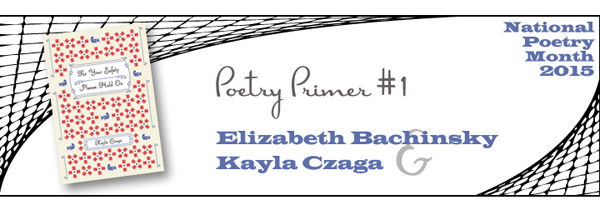
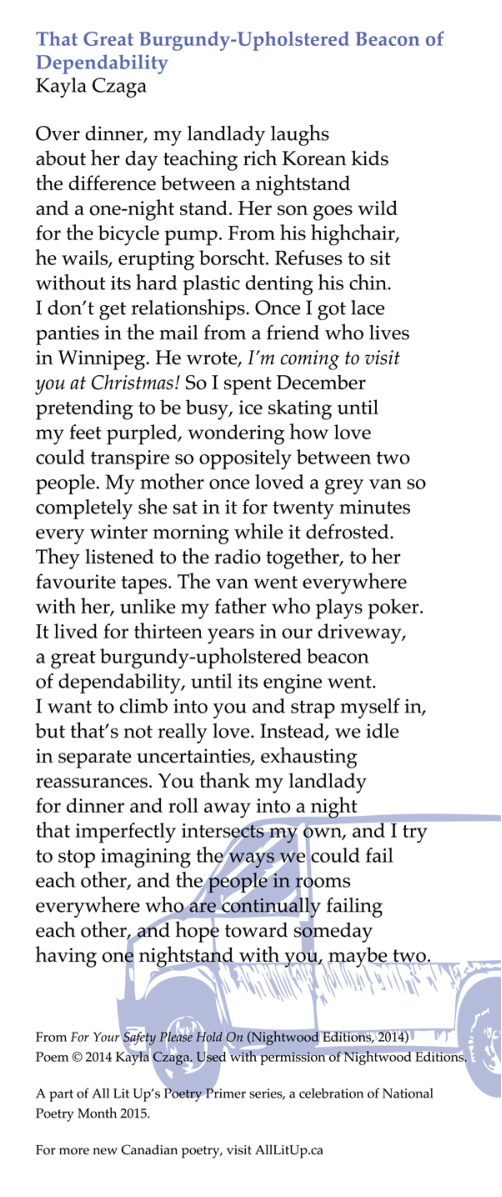
 RSS Feed
RSS Feed
